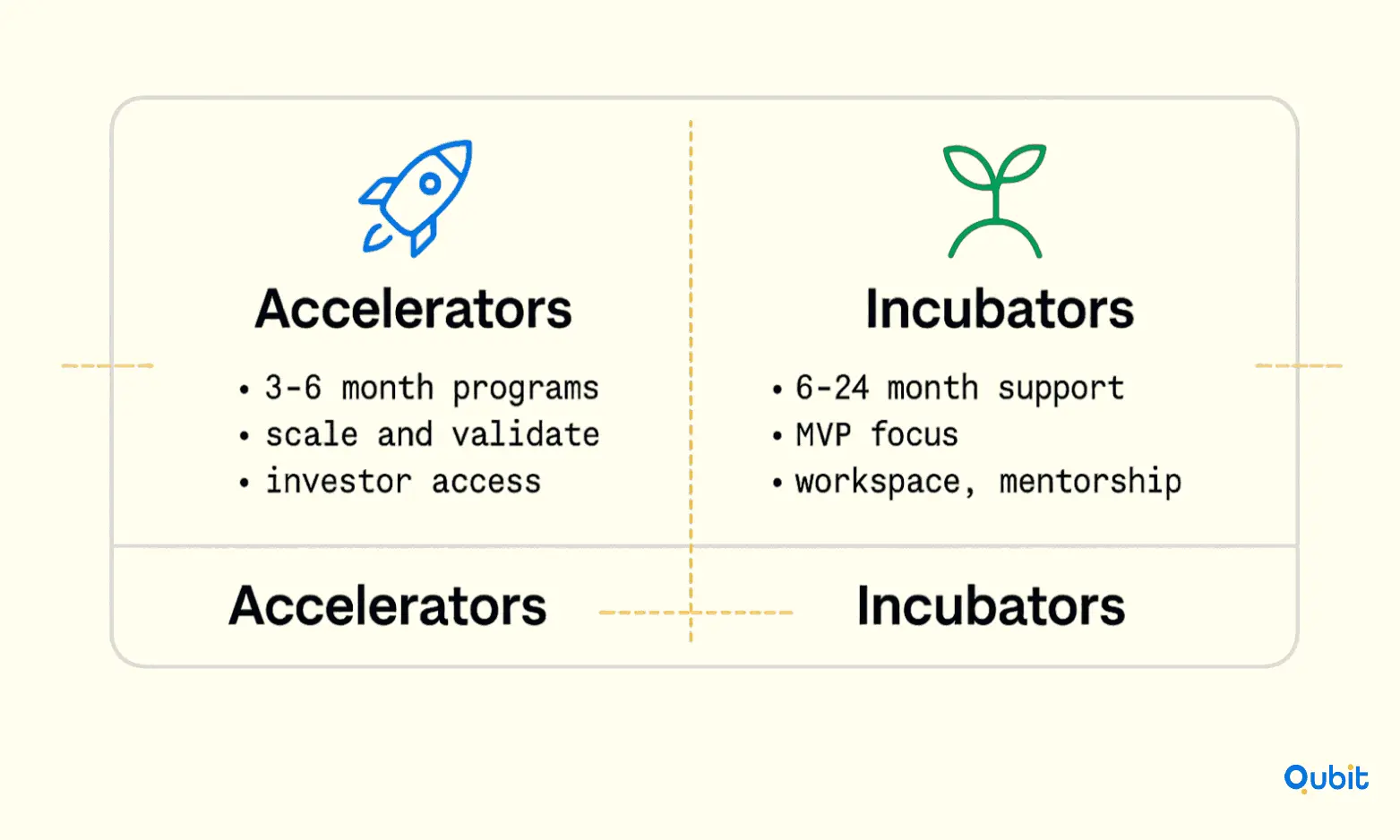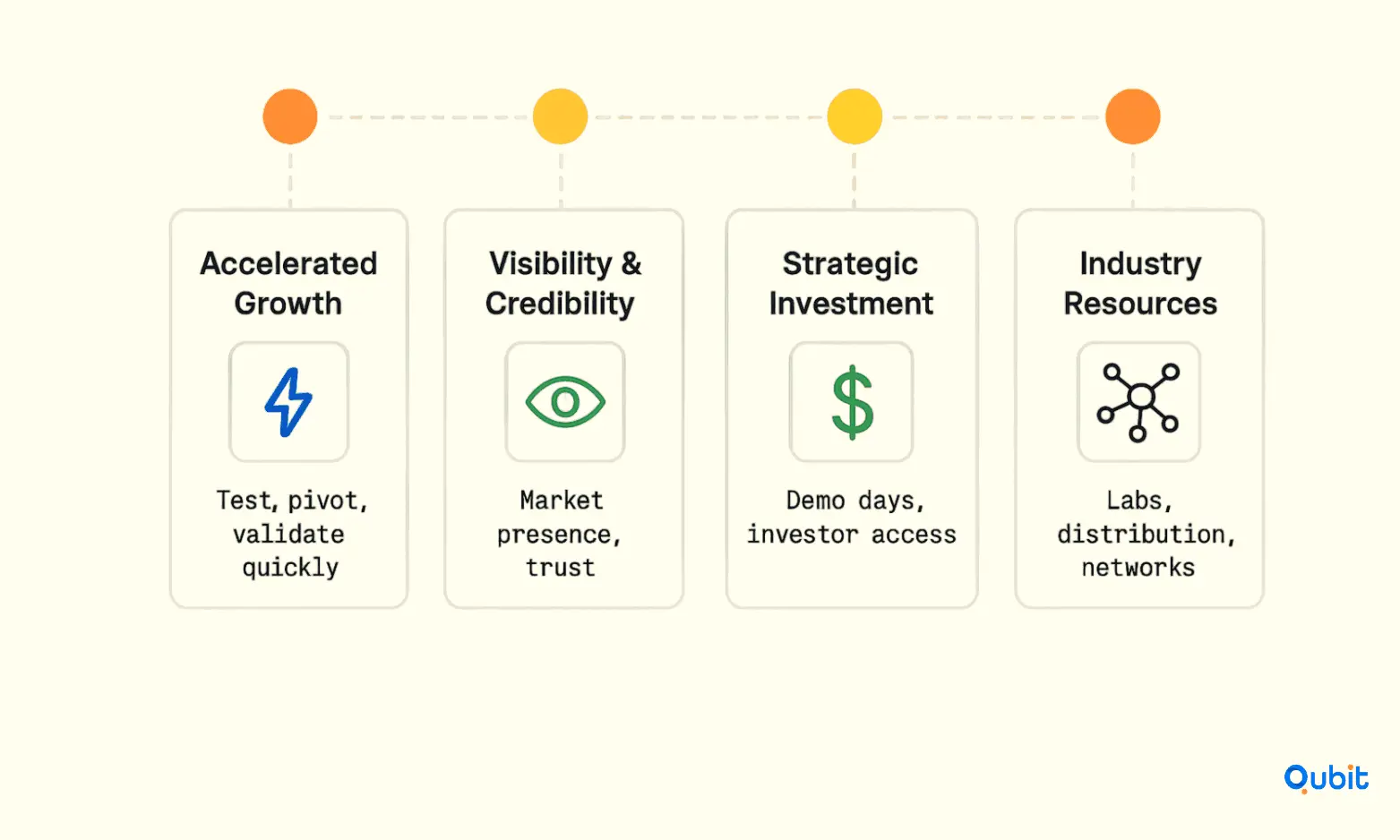In recent years, agriculture and food technology (Agri/FoodTech) have transitioned from traditional practices to cutting-edge innovations, aiming to solve global challenges such as food insecurity, sustainability, climate change, and supply chain efficiency. Accelerator and incubator programs have become key catalysts in fostering these groundbreaking innovations by providing resources, mentorship, funding, and strategic guidance to emerging startups in this vibrant sector.
Understanding the financial landscape is equally crucial for early-stage startups. Additional insights from seed funding agritech startups shed light on early-stage investment methods that resonate with the broader discussion on program-based funding pathways. This combination of accelerator support and seed funding creates a robust foundation for startups aiming to revolutionize agriculture and food technology.
This article explores the significance of accelerators and incubators within the Agri/FoodTech landscape, detailing their unique roles, highlighting exemplary programs, and outlining how startups can effectively leverage these ecosystems to scale rapidly and impactfully.
Understanding the Difference: Accelerators vs. Incubators
Before diving deeper, it's essential to differentiate accelerators and incubators, as these terms often get used interchangeably, though they serve distinct purposes.

- Accelerators typically run shorter, intensive programs, usually lasting three to six months. They aim to quickly validate, scale, and accelerate early-stage startups that already have a viable product or service, providing structured mentorship, investor introductions, and funding opportunities. Examples include Y Combinator or Techstars.
- Incubators, on the other hand, nurture startups over a longer duration (often six months to two years), providing workspace, industry expertise, foundational mentorship, and sometimes seed funding to startups in their infancy, helping them to move from idea to minimum viable product (MVP).
Both models have proven highly beneficial to Agri/FoodTech startups, addressing different stages and types of support needed for effective growth.
Why Agri/FoodTech Needs Specialized Programs
Agriculture and food tech industries face unique challenges including long product-development cycles, regulatory hurdles, and high initial capital investment needs. Unlike consumer apps or software startups, Agri/FoodTech ventures often involve biological systems, manufacturing, regulatory compliance, and supply chain complexity. Accelerator and incubator programs tailored specifically for Agri/FoodTech thus provide targeted resources, industry-specific expertise, and strategic partnerships essential for navigating these challenges effectively.
Here are several reasons why specialized Agri/FoodTech programs stand out:
1. Industry Expertise and Connections
Specialized programs offer access to mentors and experts deeply rooted in agriculture, biotechnology, food science, and sustainability, providing insights and connections to rapidly advance startups.
2. Tailored Funding Opportunities
Focused programs attract specialized investors, venture capitalists, impact funds, and corporate sponsors who understand the unique needs, timelines, and potential returns in the Agri/FoodTech industry.
3. Regulatory Navigation
These programs often provide guidance on compliance and regulatory hurdles specific to food safety, biotechnology approvals, environmental impact assessments, and international trade restrictions.
4. Pilot and Field Testing
Agri/FoodTech-specific accelerators or incubators often have partnerships with farms, food production companies, research institutes, and governments, facilitating essential field tests and pilot projects.
Leading Global Agri/FoodTech Accelerators and Incubators
To illustrate the role and significance of these programs, let's examine several world-renowned examples:
1. Food-X
Food-X, headquartered in New York, is one of the pioneering accelerators dedicated to Agri/FoodTech startups. It offers an intensive 3-month program, providing early-stage startups with seed capital, mentorship from seasoned entrepreneurs, corporate connections, and access to leading food innovation networks. Past successful alumni include Rise Products, which transforms brewery waste into nutritious flour, and Simply Good Jars, innovating sustainable packaging solutions.
2. IndieBio
Based in San Francisco and New York, IndieBio has emerged as one of the world’s most respected biotech and foodtech accelerators. Their four-month program supports startups developing breakthrough technologies in alternative proteins, sustainable agriculture, and bioengineering. Notable alumni include Memphis Meats (now Upside Foods), pioneers in cultivated meat, and Clara Foods (now The EVERY Company), creators of animal-free egg proteins.
3. Plug and Play AgriFood
This global accelerator headquartered in Silicon Valley uniquely bridges early-stage startups with Fortune 500 companies. With operations in North America, Europe, and Asia, Plug and Play focuses on digital farming, food processing innovations, and supply chain optimization. Alumni startups benefit from direct partnerships with global giants like Nestlé, PepsiCo, and Bayer.
4. Rabobank FoodBytes!
FoodBytes!, powered by Rabobank, uniquely combines an accelerator, pitch competition, and mentorship platform. With programs in multiple continents, it focuses on sustainable farming practices, regenerative agriculture, food waste reduction, and novel food products. The extensive global network, including connections with Rabobank’s international agribusiness finance arm, offers startups unparalleled industry access.
5. Rockstart AgriFood
Based in the Netherlands, Rockstart AgriFood provides a six-month accelerator program dedicated to sustainable and regenerative agriculture practices, circular economy solutions, and alternative proteins. Their robust European connections and direct access to test farms provide startups real-world testing environments crucial for product validation.
A review of angel investors foodtech provides a perspective on private investment trends in FoodTech ventures, complementing the strategic context surrounding these programs. These funding avenues, combined with accelerator support, create a robust ecosystem for innovation.
Why These Programs Matter
Accelerators and incubators not only provide funding but also mentorship, networking opportunities, and access to cutting-edge technologies. They serve as catalysts for startups to scale their operations and make a meaningful impact in the AgriTech and FoodTech industries.
By embracing trends like precision agriculture and AI-driven analytics, these programs empower startups to address global challenges such as food security, sustainability, and climate change.
Benefits for Startups Participating in Accelerator & Incubator Programs

1. Accelerated Growth & Validation
Programs provide structured timelines to rapidly test, pivot, and validate product-market fit, significantly reducing early-stage risks and speeding up commercial readiness.
2. Enhanced Visibility and Credibility
Participating startups enjoy increased exposure, credibility, and market presence by association with recognized accelerator and incubator brands, crucial for attracting further investments.
3. Access to Strategic Investment
Demo days and investor showcases facilitated by these programs dramatically improve access to investment, allowing startups to present their innovations directly to Agri/FoodTech-savvy investors.
4. Industry-Specific Resources and Networks
Dedicated programs provide direct access to critical industry-specific resources, including lab facilities, farm sites, distribution channels, and global supply chain connections, significantly easing startup operational hurdles.
How Startups Can Leverage These Programs Effectively
Maximizing value from an accelerator or incubator is critical. Here’s how startups can extract maximum benefit:
1. Clearly Define Objectives
Entering the program with well-defined business milestones ensures startups leverage mentorship, resources, and networking opportunities effectively.
2. Active Engagement
Successful startups actively engage with mentors, attend networking events, seek feedback consistently, and remain open to strategic pivots suggested by industry veterans.
3. Utilize Pilot and Field Testing Opportunities
Leveraging facilities, farms, and pilot projects provided by programs allows startups to obtain critical validation data, refine products, and attract investors with demonstrable results.
4. Prioritize Strategic Partnerships
Building early and strategic industry partnerships through program connections often results in longer-term relationships that significantly amplify business impact and growth opportunities.
Challenges Faced by Agri/FoodTech Startups in Programs
Despite numerous benefits, startups face challenges in such programs:
- Balancing Operational Demands: Intensive programs require significant time commitment, posing challenges for small teams balancing product development and business operations simultaneously.
- Pressure to Pivot Rapidly: Accelerator environments may pressure startups to quickly pivot business models, sometimes causing misalignment with founders' original visions.
- Short-term vs. Long-term Tradeoffs: Some programs emphasize rapid investor-friendly growth, potentially clashing with sustainability-focused startups requiring patient capital.
The Future: Emerging Trends in Agri/FoodTech Accelerators & Incubators
As Agri/FoodTech continues evolving, accelerator and incubator programs adapt to emerging trends, including:
1. Increased Focus on Sustainability & Climate Adaptation
Future programs will strongly emphasize startups innovating sustainable agriculture methods, regenerative agriculture practices, climate-resilient crops, and carbon sequestration solutions.
2. Rise of Alternative Proteins and Biotech Food Innovations
Programs will increasingly prioritize startups advancing lab-grown meats, precision fermentation, plant-based proteins, and biotechnology solutions addressing sustainability and food security.
3. Digital Transformation and AI Integration
Accelerators and incubators will foster startups leveraging AI, blockchain, IoT, and robotics to streamline farming practices, reduce waste, optimize supply chains, and enhance food traceability.
4. Collaborative Global Ecosystems
Expect greater collaboration across continents, with programs becoming interconnected ecosystems, facilitating global exposure, strategic partnerships, and cross-border growth opportunities.
Conclusion
Success in the startup world hinges on strategic planning and actionable insights. Throughout this blog, we’ve explored essential strategies, from building a comprehensive directory to leveraging financial consulting tips, all aimed at empowering startups to thrive. By focusing on data-driven approaches and clear next steps, you can position your business for sustainable growth and attract the right investors.
At Qubit Capital, we understand the challenges startups face and are here to help you connect with investors who align with your vision. Let us guide you through the process and scale your startup to new heights.
Get in touch with us at Qubit Capital to connect with the right investors and scale your startup.
Key Takeaways:
- Accelerators rapidly scale startups with intensive short-term programs.
- Incubators provide foundational support over longer durations.
- Specialized Agri/FoodTech programs offer industry-specific mentorship and expertise.
- Industry-focused accelerators connect startups directly to specialized investors.
- Access to pilot farms and field testing is crucial for Agri/FoodTech validation.
- Food-X, IndieBio, Plug and Play, FoodBytes!, and Rockstart lead global Agri/FoodTech programs.
- Startups gain accelerated growth and product-market validation from these programs.
Frequently asked Questions
What are agritech accelerator programs?
Agritech accelerator programs are specialized initiatives designed to support startups in the agricultural technology sector. These programs provide resources such as mentorship, funding, and networking opportunities to help startups scale their innovations and bring impactful solutions to the market.


 Back
Back



